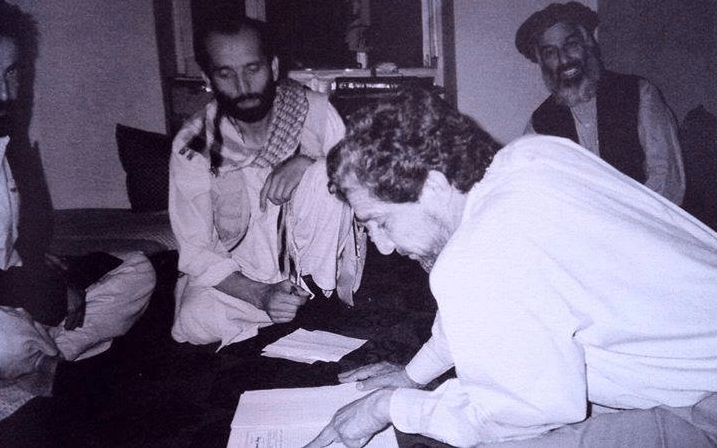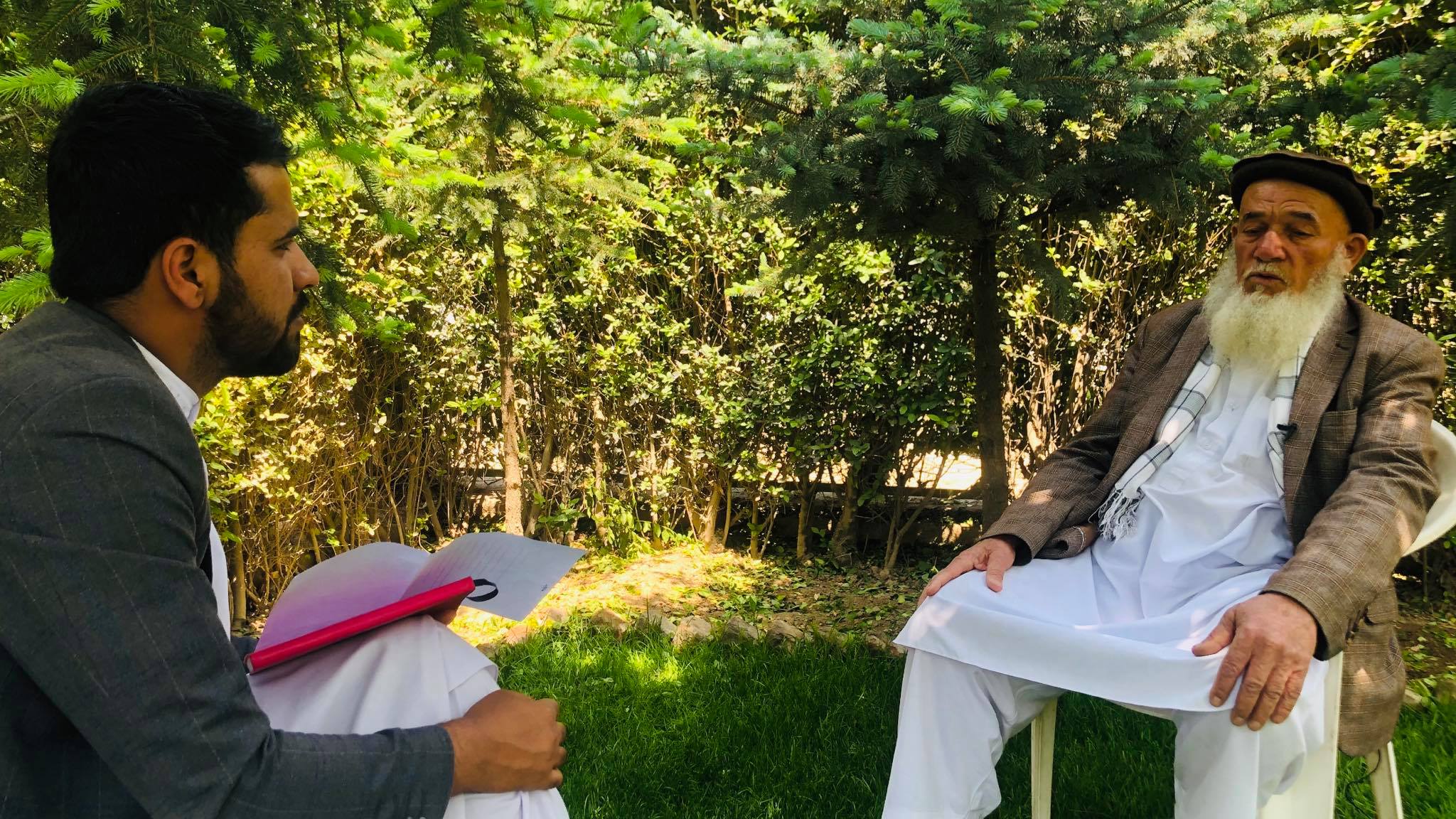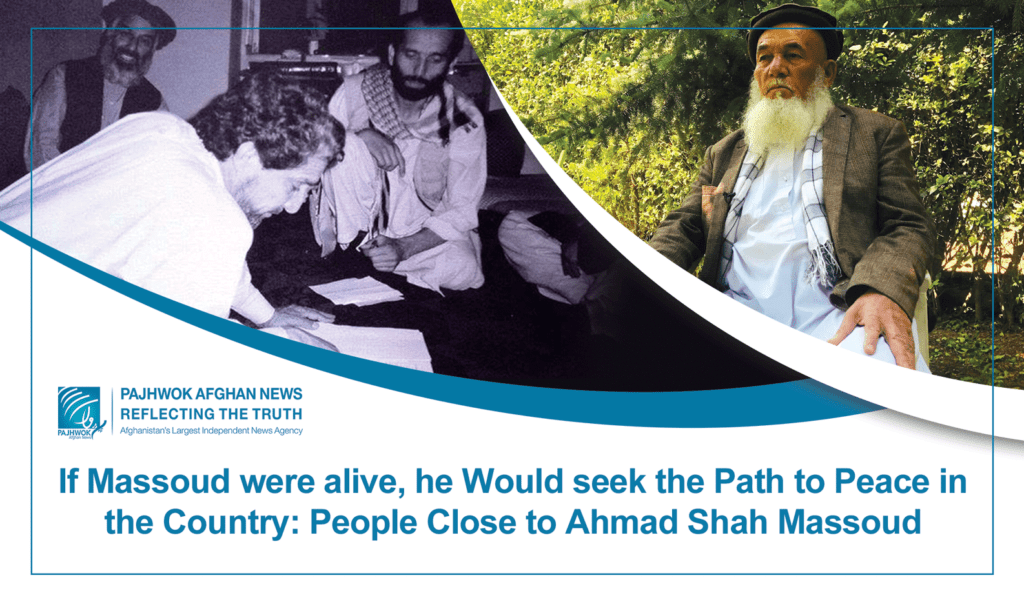PARAKH (Pajhwok): Some relatives of Ahmad Shah Massoud say the veteran Jihadi commander did not believe in revenge. They believe if Massoud were alive today, he would have found a path to lasting and dignified peace in Afghanistan.
Massoud, the Jamiat-i-Islami leader, was assassinated on September 9, 2001 –two days before the 9/11 attacks that changed Afghanistan, by two Arabs who identified themselves as journalists in the Khwaja Bahauddin area of northern Takhar province.
A relative of the commander, Rahmatullah Begana was born in 1961 in a village of Panjsher. He holds a bachelor degree in Islamic Jurisprudence and a master’s In International Relations. He has been living in Kabul for the past 50 years.
Islamic Jurisprudence and a master’s In International Relations. He has been living in Kabul for the past 50 years.
Begana, who has served on the Resistance Front Committee of Jamiat-i-Islami, thinks the current peace process would not succeed because the Taliban were not willing for reconciliation.
“Based on Taliban’s statements, Afghanistan’s current perspective on peace is not clear. The Taliban think they have won on the battlefield and will not easily accept a peace that is not in their interest,” he opined.
Begana underlined an end to the 40-year-long conflict in Afghanistan. If the government did not demonstrate flexibility and did not make compromises, peace could not be achieved, he said
He acknowledged peace was important and that petty interests of groups and individuals should be sacrificed to achieve that lofty goal.
Asked if he were alive, what Massoud would have done for peace in the current situation in the country, he replied: “Amir Sahib had made great efforts for peace. He even took the risk of going to a Taliban-controlled area to raise his voice for peace.”
“Right from the word go until his martyrdom, the National Hero worked for peace — a dignified peace that would benefit the majority of the Afghan people … he didn’t seek to revenge.
“If he were alive, Massoud would have raised questions about the legitimacy of the war. He would have asked whose war it is and what the objective behind it is.”
Begana noted the conflict in Afghanistan had taken a heavy toll on the warring parties and civilians. Unfortunately, conflict, insecurity and violence continued to haunt the country, he added.
“Unfortunately, after the independence of the country, the conflict lost its legitimacy. The current war has morphed into a battle for power. After the economic war started in this country, some people have found their way to the palace,” he claimed.
He quoted a wise woman as saying, that in the era of Hazrat Suleiman, there was a powerful kingdom in the Saba region — modern day’s Yemen. Saba was the most famous state in the history of the Arabian Peninsula.
Begana said when the Queen of Saba received the warning of war from Hazrat-i-Suleman, she responded after consultation with her cabinet: “Our economy will be ruined and honourable people humiliated if the king attacks our areas.”
He said then the Queen of Saba offered peace to Hazrat Suleman. At the end of the story, he commented: “After thousands of years, we have not understood the sorrow and hardships created by war. This calamity is taking its toll on us daily.”
Sufi Mohammad Saeed Sufizada, 73, was born in the Shtal district of Panjsher. He is currently living in Kabul. He was one of the individuals close to Massoud.
individuals close to Massoud.
“If Massoud were alive, he would have tried to establish peace and end bloodshed to ensure the return of lasting peace to the country,” he said.
According to him, Massoud had asked the Taliban several times to put an end to the foreign-imposed war and embrace peace so that no more Afghans were killed.
Sufizada, who calls himself the mobiliser of Panjsher people against the Soviet forces, highlighted the negative effects of the war.
He recalled: “One day, we captured a base in the Hesa-i-Awal area of Panjsher. An airstrike by the Russians hit a village and killed 23 people, including children and women.
“A warplane was dropping cluster bombs and we were collecting body parts of our people. None could be identified. Some were trapped under debris and others had been missing for weeks.”
Sufizada commended the Afghan people for enduring hardships and rendering sacrifices during the jihad against the Soviet troops.
“We were atop a hill. People of the village brought us food in bullet boxes. When we took food out of boxes, it would taste bitter due to being placed in the middle of bullets.”
Sufizada said: “We would place it in the sun, as there was no other option. After a clash took place, we stayed hungry four nights. All fighters were forced to eat the same bitter food.”
The foreign-imposed war was still underway in the country, taking a heavy toll on the common people, he regretted.
According to him, war is not the solution to any problem. In case of aggression, he said, non-combatants reserved the right to defend themselves.
He called for peace, in which rights of people were guaranteed. The Taliban should embrace peace, he said, asking the government to show flexibility to let the peace process could reach a positive conclusion and Afghans could rebuild their country.
sa/mud
Visits: 250









GET IN TOUCH
NEWSLETTER
SUGGEST A STORY
PAJHWOK MOBILE APP